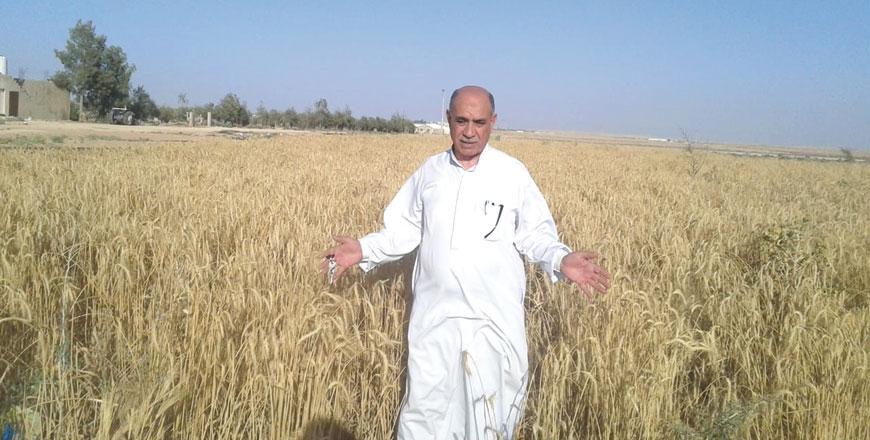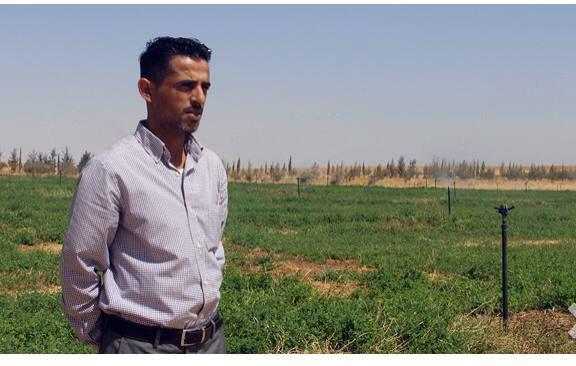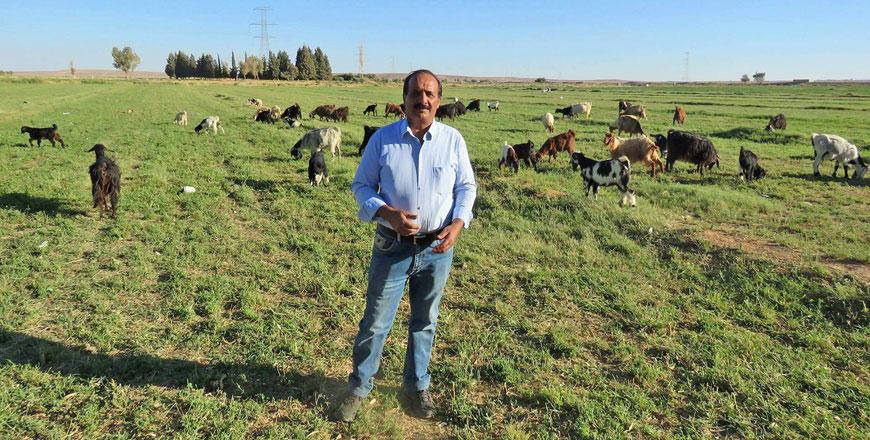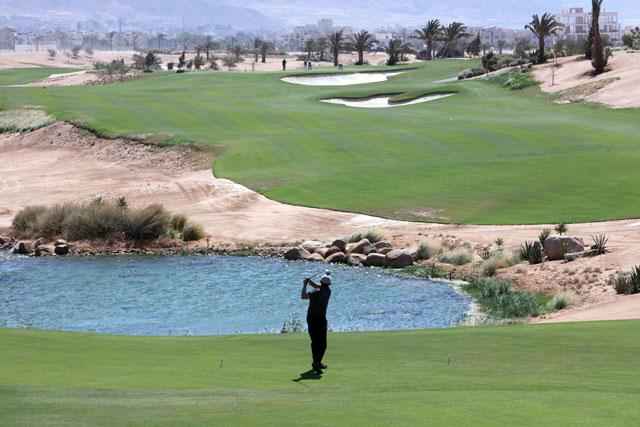You are here
From law to biosaline agriculture, Turman challenges coventional farming techniques
By Reem Rawashdeh - Jan 03,2019 - Last updated at Jan 03,2019

Odeh Turman speaks to The Jordan Times as his sons took photos of him amid the spikes of wheat, ready for harvest, in Al Khalidiyeh, 20km from the centre of Mafraq Governorate, in the east of Jordan (Photo courtesy of Reem Rawashdeh)
AMMAN — For Odeh Al Turman, a man in his 60s, reaching the age of retirement was not the end of the road. Instead, it was the beginning of a new journey; a new career he has always dreamt of.
Turman, who hails from Al Khalidiyeh, 20km from the centre of Mafraq Governorate in the east of Jordan, used to be an attorney.
Two years ago, he decided to leave the marble floors of the court to stand tall on the soil and toil on the land.
He started out growing green produce at first, but ended up incurring great losses two seasons ago, when he began growing tomatoes and other conventional crops, he told The Jordan Times.
Following a season of loss, he decided to pay a visit to the town’s agricultural station, which is affiliated with the National Centre for Agricultural Research to inquire about “fish farming”.
Contrary to what one would think, farming fish in the desert can be quite lucrative, which is what Turman set out to do, until he was faced with an entire world of new possibilities; biosaline agriculture.
According to Turman, it was the scarcity of water and the high levels of salinity (salt concentration) that drove him to consider fish farming at first.
“I went to ask about fish farming at the Khalidiyeh station... [but] after I sat down with the agricultural engineers there, they talked me into trying something new, that comes at a low cost, and that is a profitable investment,” he said in reference to biosaline farming.
They suggested growing barley, wheat and oat, but only through biosaline agricultural techniques can it work, given the salinity of the soil and water, he continued to explain.
Notably, biosaline agriculture is a farming technique launched by the International Centre For Biosaline Agriculture (ICBA), in cooperation with the National Centre for Agricultural Research in Jordan.
It is based on growing salt-tolerant plants and halophytes that can tolerate a high level of both salinity and temperatures.
The idea itself comes from nature; specifically from the fact that salt-tolerant plants grow naturally on beaches, sea tide areas, playa lakes (or sabkha) and other areas covered by saline water.
The salinity of the Zarqa underground water basin — the source of water for Turman’s crops — rises in the summer to 2000 parts per million (ppm) and falls to 1500ppm in winter.
It was all sorted out for Turman there and then, he said.
“I walked out fully convinced of the idea, and I promised to come back a few days later for the seeds, to go ahead with the project, towards the end of 2017,” Turman noted.
According to the lawyer-now-farmer, sowing and prepping one dunum of land to grow vegetables used to cost him JD200 to JD300, including the costs for seed sowing, water installations and other preparations.
When it came to growing salt-tolerant plants, however, the costs of sowing and preparations, per dunum, dropped to no more than JD120, which is drastic in business terms, he underlined.
Although Turman was late in catching up on the biosaline agricultural season, he managed to sow around 15 dunums of his land with super germinating (fast-sprouting) seeds that he had acquired from the National Agricultural Research Centre for free, he said.
As his sons took photos of him amid the spikes of wheat, ready for harvest, he said: “Now, I will invest the returns from these 15 dunums to prepare and treat another 100 dunums.”
“This does not require much thought,” he said, “especially after the massive losses I incurred with conventional vegetable farming”.
One obstacle down, Turman still has to overcome a few more, regarding the overhead costs of labour and harvest.
“The only hurdle that still worries me is the lack of harvest and sowing machinery,” he highlighted.
Workers refuse to work small plots of land, he said, and would rather work on large lands, which adds to the costs of harvest, Turman explained.
“I would be better off without such expenses,” he said.
“If only I were able to secure the machinery, I would be ready for the coming season of 100 new dunums,” he concluded.
Related Articles
AMMAN — It is not a secret that Jordan suffers from water scarcity; more so with the change in climate and rainfall fluctuations over the pa
AMMAN — For many years, the ruthless desert-like climate of the Husseinyieh area, in the Southern Badia district, used to push farmers and i
AQABA — Some 72 golfers took part in an amateur tournament on Friday to mark the opening of Jordan’s first 18-hole championship golf course














